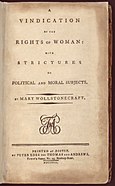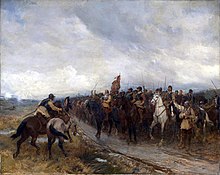Portal:Politics/Selected article
These are articles that are selected for the Politics portal.
Usage
The layout design for these subpages is at Portal:Politics/Selected article/Layout.
- Add a new Selected article to the next available subpage.
- The "blurb" for all selected articles should be approximately 10 lines, for appropriate formatting in the portal main page.
- Update "max=" to new total for its {{Random portal component}} on the main page.
Selected articles list
Selected article 1
Portal:Politics/Selected article/1
The
Selected article 2
Portal:Politics/Selected article/2
The
Selected article 3
Portal:Politics/Selected article/3
The
Selected article 4
Portal:Politics/Selected article/4
The
Selected article 5
Portal:Politics/Selected article/5
The
Selected article 6
Portal:Politics/Selected article/6
The
Selected article 7
Portal:Politics/Selected article/7
The
Selected article 8
Portal:Politics/Selected article/8
A Vindication of the Rights of Woman is a 1791 book of feminist philosophy by Mary Wollstonecraft. In it, Wollstonecraft responds to the educational and political theorists of the eighteenth century who wanted to deny women an education. She argues that women ought to have an education commensurate with their position in society, claiming that women are essential to the nation because they educate its children and because they could be "companions" to their husbands, rather than mere wives. Instead of viewing women as ornaments to society or property to be traded in marriage, Wollstonecraft maintains that they are human beings deserving of the same fundamental rights as men. Wollstonecraft was prompted to write the Rights of Woman by Charles Maurice de Talleyrand-Périgord's 1791 report to the French National Assembly which stated that women should only receive a domestic education; she used her commentary on this specific event to launch a broad attack against sexual double standards and to indict men for encouraging women to indulge in excessive emotion. Wollstonecraft wrote the Rights of Woman hurriedly in order to respond directly to ongoing events; she intended to write a more thoughtful second volume, but she died before completing it.
Selected article 9
Portal:Politics/Selected article/9
The
Selected article 10
Portal:Politics/Selected article/10
Selected article 11
Portal:Politics/Selected article/11
Selected article 12
Portal:Politics/Selected article/12
The
Selected article 13
Portal:Politics/Selected article/13
The
Selected article 14
Portal:Politics/Selected article/14
The
Selected article 15
Portal:Politics/Selected article/15
A
Selected article 16
Portal:Politics/Selected article/16
The
Selected article 17
Portal:Politics/Selected article/17
The
Selected article 18
Portal:Politics/Selected article/18
The
Selected article 19
Portal:Politics/Selected article/19
The
Selected article 20
Portal:Politics/Selected article/20
The
Selected article 21
Portal:Politics/Selected article/21
The
Selected article 22
Portal:Politics/Selected article/22
Selected article 23
Portal:Politics/Selected article/23
The
Selected article 24
Portal:Politics/Selected article/24
The Act of Independence of Lithuania was signed by the Council of Lithuania on 16 February 1918, proclaiming the restoration of an independent State of Lithuania, governed by democratic principles, with Vilnius as its capital. The act was signed by all twenty members of the council, chaired by Jonas Basanavičius. The act of 16 February was the end result of a series of resolutions on the issue, including one issued by the Vilnius Conference and the act of 8 January. The path to the act was long and complex because the German Empire exerted pressure on the council to form an alliance. The Council had to carefully manoeuvre between the Germans, whose troops were present in Lithuania, and the demands of the Lithuanian people. While the act's original document has been lost, its legacy continues. The laconic act is the legal basis for the existence of modern Lithuania, both during the interwar period and since 1990. The act formulated the basic constitutional principles that were and still are followed by all Constitutions of Lithuania. The act itself was a key element in the foundation of Lithuania's Act of the Re-Establishment of the State of Lithuania, adopted on 11 March 1990. Lithuania, breaking away from the Soviet Union, stressed that it was simply re-establishing the independent state that existed between the world wars and that the act never lost its legal power.
Selected article 25
Portal:Politics/Selected article/25
The
Selected article 26
Portal:Politics/Selected article/26
The
Selected article 27
Portal:Politics/Selected article/27
The
Selected article 28
Portal:Politics/Selected article/28
The
Selected article 29
Portal:Politics/Selected article/29
Selected article 30
Portal:Politics/Selected article/30
The
Selected article 31
Portal:Politics/Selected article/31
The
Selected article 32
Portal:Politics/Selected article/32
Selected article 33
Selected article 34
Portal:Politics/Selected article/34
Niccolò di Bernardo dei
Selected article 35
Portal:Politics/Selected article/35
The
Selected article 36
Portal:Politics/Selected article/36
America's 60 Families is a book by American journalist Ferdinand Lundberg published in 1937 by Vanguard Press. It is an argumentative analysis of wealth and class in the United States, and how they are leveraged for purposes of political and economic power, specifically by what the author contends is a "plutocratic circle" composed of a tightly interlinked group of 60 families.
Selected article 37
Portal:Politics/Selected article/37
The constitution of the Roman Republic was a set of uncodified norms and customs which, together with various written laws, guided the procedural governance of the Roman Republic. The constitution emerged from that of the Roman kingdom, evolved substantively and significantly – almost to the point of unrecognisability – over the almost five hundred years of the republic. The collapse of republican government and norms beginning in 133 BC would lead to the rise of Augustus and his principate.
Selected article 38
Portal:Politics/Selected article/38
The
Selected article 39
Portal:Politics/Selected article/39

The
Selected article 40
Portal:Politics/Selected article/40

The women's poll tax repeal movement was a movement in the United States, predominantly led by women, that attempted to secure the abolition of poll taxes as a prerequisite for voting in the Southern states. The movement began shortly after the ratification in 1920 of the Nineteenth Amendment to the United States Constitution, which granted suffrage to women. Before obtaining the right to vote, women were not obliged to pay the tax, but shortly after the Nineteenth Amendment became law, Southern states began examining how poll tax statutes could be applied to women. For example, North and South Carolina exempted women from payment of the tax, while Georgia did not require women to pay it unless they registered to vote. In other Southern states, the tax was due cumulatively for each year someone had been eligible to vote.
Selected article 41
Portal:Politics/Selected article/41
The Anglo-Scottish war (1650–1652), also known as the Third Civil War, was the final conflict in the Wars of the Three Kingdoms, a series of armed conflicts and political machinations between shifting alliances of religious and political factions in England, Scotland and Ireland.
Selected article 42
Portal:Politics/Selected article/42

The
Selected article 43
Portal:Politics/Selected article/43
The
Selected article 44
Portal:Politics/Selected article/44

Regulamentul Organic (Romanian: [reɡulaˈmentul orˈɡanik], Organic Regulation; French: Règlement Organique; Russian: Органический регламент, romanized: Organichesky reglament) was a quasi-constitutional organic law enforced in 1831–1832 by the Imperial Russian authorities in Moldavia and Wallachia (the two Danubian Principalities that were to become the basis of the modern Romanian state). The document partially confirmed the traditional government (including rule by the hospodars) and set up a common Russian protectorate which lasted until 1854. The Regulamentul itself remained in force until 1858. Conservative in its scope, it also engendered a period of unprecedented reforms which provided a setting for the Westernization of the local society. The Regulamentul offered the two Principalities their first common system of government.
Selected article 45
Portal:Politics/Selected article/45
The inner German border (German: innerdeutsche Grenze or deutsch–deutsche Grenze; initially also Zonengrenze) was the frontier between the German Democratic Republic (GDR, East Germany) and the Federal Republic of Germany (FRG, West Germany) from 1949 to 1990. De jure not including the similar but physically separate Berlin Wall, the border was 1,381 kilometres (858 mi) long and ran from the Baltic Sea to Czechoslovakia.
Selected article 46
Portal:Politics/Selected article/46
Selected article 47
Portal:Politics/Selected article/47

The
Selected article 48
Portal:Politics/Selected article/48
"
Selected article 49
Portal:Politics/Selected article/49
"
Selected article 50
Portal:Politics/Selected article/50
Selected article 51
Nominations
- Adding articles
- Feel free to add an article (B-Class, GA-Class, FA-Class or higher) to the list above.
- If you are unsure or do not know how to add an entry, please ask for help at the Portal talk:Politics talk page.

































